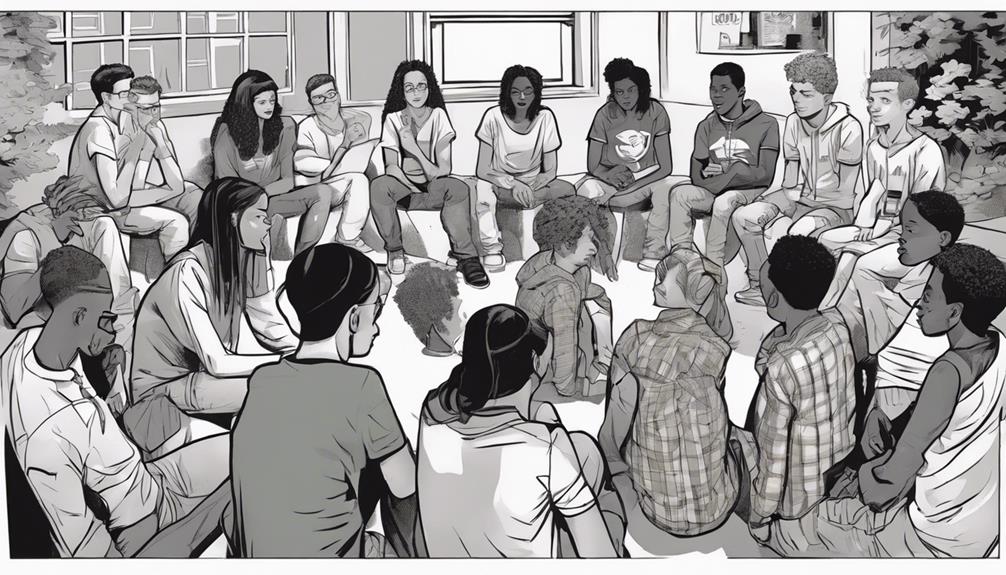Discover the magic of **library adventures** to make school days **extra special**! Exploring the library can **boost language skills**, **build confidence**, and **sharpen critical thinking**. Fun group activities, like reading out loud and holding costume contests, make things even better. How about a library scavenger hunt? It helps kids explore on their own and learn about new resources. Creative quizzes test how much they’ve understood, encourage teamwork, and make them better researchers. These cool ideas don’t just help grades—they make kids love learning. Find out how these fun activities can **transform engagement** and **spark a reading culture** in schools.
Key Takeaways
- Library adventures promote curiosity, creativity, and critical thinking.
- Collaborative activities like reading together and creative projects enhance engagement.
- Hosting events like book clubs and author sessions fosters student interest.
- Library scavenger hunts offer dynamic, inclusive, and explorative learning experiences.
- Creative book quizzes encourage teamwork, research skills, and engagement with literature.
Benefits of Library Reading Time
Within the school community, the benefits of allocating time for library reading sessions are vital and far-reaching. Reading physical books not only alleviates symptoms of depression but also improves overall wellbeing.
Encouraging a love of reading from a young age can have a profound impact on learning in childhood and adult life. Extensive reading not only enhances language acquisition but also boosts confidence in using technical terminology.
Library reading time can play an essential role in reducing screen time, combating issues like nearsightedness in children. Moreover, developing a passion for reading through library visits can lead to long-term benefits for students, fostering a sense of curiosity, creativity, and critical thinking that extends beyond the classroom setting.
Collaborative Activities for Engagement

Exploring collaborative activities in the library setting can offer students engaging opportunities to interact with reading material and develop critical skills beyond traditional reading sessions. By engaging in activities like reading to each other, creating projects inspired by books, and collaborating on creative endeavors, students can enhance their comprehension and critical thinking abilities. Encouraging students to work together on projects such as building models, analyzing word frequencies, or designing costumes from books can foster a deeper connection to the reading material and spark creativity. Below is a table showcasing various collaborative activities that can be implemented in the library setting:
| Collaborative Activities |
|---|
| Reading to Each Other |
| Creative Projects |
| Building Models |
Hosting Competitions and Events

Engaging students through competitions and events in the library setting can create vibrant opportunities for fostering a love of reading and literature.
Celebrating events like World Book Day with costume contests and book-related activities can bring the magic of storytelling to life.
Inviting local authors to share their work inspires students to connect with reading on a personal level.
Organizing book clubs or genre-specific events caters to diverse interests, encouraging exploration and discovery.
Planning visits to reading-related places immerses students in the world of books, making literature more tangible and engaging.
Library Scavenger Hunt Ideas

To further enhance student engagement and exploration in the library setting, implementing creative and interactive Library Scavenger Hunt ideas can provide a dynamic learning experience that promotes independent discovery and familiarity with various resources available.
Organizing a scavenger hunt tailored to different age groups or reading abilities guarantees inclusivity and active participation. These hunts, designed to be fun and interactive, allow students to navigate the library space while searching for specific books or resources, encouraging self-directed exploration.
Creative Book-Related Quizzes

Conducting creative book-related quizzes can be an important method to assess students' understanding of reading material while fostering a culture of engagement with literature. By dividing students into groups, these quizzes promote teamwork and collaboration in answering questions, enhancing social skills.
Quizzes not only test knowledge but also encourage students to look up information in books, improving their research abilities. Including competitive elements in the quizzes can make the activity engaging and enjoyable for students, motivating them to participate actively.
Through these quizzes, students can have fun while deepening their comprehension of books, contributing to a school community that values reading and intellectual growth. Creative book-related quizzes, with their interactive and educational nature, play an essential role in promoting a culture of literacy and learning.
Student Engagement Strategies

Utilizing various interactive methods fosters student engagement in library activities and enhances their overall learning experience. Strategies such as collaborative projects, competitions, scavenger hunts, and book-related quizzes can make library visits exciting and educational. Here is a table summarizing these student engagement strategies:
| Student Engagement Strategies | Description |
|---|---|
| Collaborative Projects | Engage students in creative activities related to reading material, fostering comprehension and critical thinking. |
| Competitions and Events | Celebrate literary events, invite authors, and organize book clubs to cultivate a love for reading. |
| Library Scavenger Hunt | Organize interactive hunts to familiarize students with library resources and promote independent exploration. |
| Book-Related Quizzes | Test students' comprehension, encourage teamwork, and enhance research skills through fun and competitive quizzes. |
Promoting Reading Culture in Schools

Effortlessly fostering a vibrant reading culture in schools requires implementing engaging and innovative strategies that captivate students' interest in literature. Promoting a love for reading can be achieved through various methods.
Collaborative activities in the library, such as group reading sessions and creative projects, enhance comprehension and critical thinking skills. Hosting competitions and events like book clubs or author visits can inspire students to engage with books actively.
Library scavenger hunts offer a fun way to explore different genres and resources, encouraging independent exploration. Book-related quizzes test students' comprehension and research skills while fostering teamwork. By integrating these diverse approaches, schools can create a dynamic reading culture that nurtures a lifelong passion for literature among students.
Frequently Asked Questions
How Can Library Reading Time Specifically Benefit Students With Learning Disabilities?
Library reading time benefits students with learning disabilities by providing a calming environment for focused reading, improving language skills through exposure to diverse texts, boosting confidence, and fostering a love for reading that can enhance cognitive development and academic performance.
What Are Some Unique Collaborative Activities for Older Students in the Library?
Unique collaborative activities for older students in the library include hosting literature-themed escape rooms, organizing book clubs with discussions on contemporary issues, facilitating mock trials based on literary characters, arranging author interviews or virtual book tours, and conducting writing workshops to hone creative skills.
Are There Any Special Considerations for Hosting Events in a School Library?
Special considerations for hosting events in a school library include aligning activities with educational goals, ensuring age-appropriate content, promoting inclusivity, and collaborating with educators. Events should offer engaging and diverse experiences to cultivate a love for reading and learning.
What Creative Variations Can Be Added to a Library Scavenger Hunt for Advanced Readers?
For advanced readers, infuse complexity into the library scavenger hunt by incorporating cryptic clues or riddles that require critical thinking. Challenge them to decode literary references or solve puzzles related to book plots for an enriching experience.
How Can Book-Related Quizzes Be Adapted for Students With Different Learning Styles?
Book-related quizzes can be tailored for diverse learning styles by incorporating visual, auditory, and kinesthetic elements. Utilize multimedia, interactive questions, and hands-on activities to engage students with different preferences, enhancing comprehension and retention of reading material.
Conclusion
To sum up, libraries offer a wealth of opportunities to engage students and foster a love for reading and learning.
For example, a school in Ohio implemented a library scavenger hunt where students had to search for specific books based on clues, promoting teamwork and critical thinking skills.
By incorporating interactive initiatives like this, libraries can transform into dynamic spaces where students not only expand their knowledge but also develop essential skills for their academic and personal growth.










